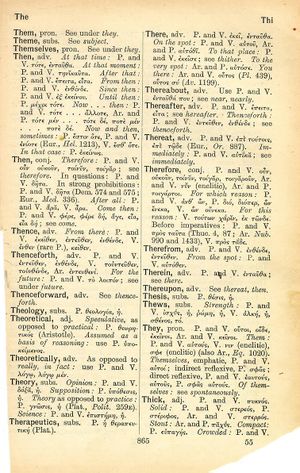then: Difference between revisions
Καλὸν τὸ θνῄσκειν, οἷς ὕβριν τὸ ζῆν φέρει → Quis foeda vita restat, his pulchrum est mori → Wem das Leben Schmach bringt, dem ist Sterben schön
(CSV5) |
m (Text replacement - " . ." to "…") |
||
| Line 14: | Line 14: | ||
<b class="b2">Until then</b>: P. [[μέχρι]] [[τότε]]. | <b class="b2">Until then</b>: P. [[μέχρι]] [[τότε]]. | ||
<b class="b2"> | <b class="b2">Now…</b> . <b class="b2">then</b>: P. and V. [[τότε]]... [[ἄλλοτε]], Ar. and P. [[τότε]] μέν... [[τότε]] δέ, ποτὲ μέν... ποτὲ δέ. | ||
<b class="b2">Now and then, sometimes</b>: P. ἔστιν ὅτε, P. and V. [[ἐνίοτε]] (Eur., ''Hel.'' 1213), V. ἔσθʼ ὅτε. | <b class="b2">Now and then, sometimes</b>: P. ἔστιν ὅτε, P. and V. [[ἐνίοτε]] (Eur., ''Hel.'' 1213), V. ἔσθʼ ὅτε. | ||
Revision as of 11:20, 26 February 2019
English > Greek (Woodhouse)
adv.
At that time: P. and V. τότε, ἐνταῦθα.
At that moment: P. and V. τηνικαῦτα.
After that: P. and V. ἔπειτα, εἶτα.
From then: P. and V. ἐνθένδε.
Since then: P. and V. ἐξ ἐκείνου.
Now… . then: P. and V. τότε... ἄλλοτε, Ar. and P. τότε μέν... τότε δέ, ποτὲ μέν... ποτὲ δέ.
Now and then, sometimes: P. ἔστιν ὅτε, P. and V. ἐνίοτε (Eur., Hel. 1213), V. ἔσθʼ ὅτε.
In that case: P. ἐκείνως.
conj.
Therefore: P. and V. οὖν, οὐκοῦν, τοίνυν, τοίγαρ; see therefore.
In questions: P. and V. δῆτα.
In strong prohibitions: P. and V. δῆτα (Dem. 574 and 575; Eur., Med. 336).
After all: P. and V. ἄρα, V. ἆρα.
Come then: P. and V. φέρε, φέρε δή, ἄγε, εἶα, εἶα δή; see come.

